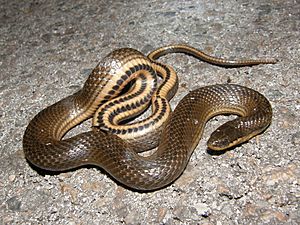Crayfish snake facts for kids
Quick facts for kids Crayfish snake |
|
|---|---|
 |
|
| Gulf crayfish snake (Liodytes r. sinicola) | |
| Conservation status | |
| Scientific classification |
|
| Kingdom: | Animalia |
| Phylum: | Chordata |
| Class: | Reptilia |
| Order: | Squamata |
| Suborder: | Serpentes |
| Family: | Colubridae |
| Genus: | Liodytes |
| Species: |
L. rigida
|
| Binomial name | |
| Liodytes rigida (Say, 1825)
|
|
| Script error: The function "autoWithCaption" does not exist. | |
| Synonyms | |
|
|
Script error: No such module "Check for conflicting parameters".
The crayfish snake (Liodytes rigida) is a special kind of snake that loves water. It's also known by other names like the glossy crayfish snake or glossy swampsnake. This snake lives in the southeastern United States. It mainly eats crayfish, which are like small freshwater lobsters.
Contents
Where Does the Crayfish Snake Live?
The crayfish snake lives in the coastal areas of the Atlantic Coast and the Gulf Coast. You can find it in states like eastern Texas, Louisiana, and northern Florida. It also lives in southern Arkansas, Mississippi, and Alabama. Other places it calls home include southern Georgia, eastern South Carolina, and southeastern North Carolina. There's even a small group living separately in eastern Virginia.
What Does the Crayfish Snake Look Like?
Adult crayfish snakes are usually about 16 inches (about 41 cm) long. They have a sturdy body. The longest one ever found was over 31 inches (about 80 cm) long!
The top of the snake's body is olive brown. Sometimes, it might have two dark stripes on its back. Its upper lips are yellow. The underside of the snake is yellow with two rows of black spots. These spots join together near its head. The underside of its tail might have a black line or be plain.
The scales on its back are arranged in 19 rows in the middle of its body. Most of these scales have a ridge, which makes them feel rough. However, the scales closest to its belly are smooth, and the next row is only slightly rough. It has between 132 and 142 belly scales. The scale covering its vent (where waste leaves the body) is split into two parts. The scales under its tail are also split and number between 51 and 71.
What Do Crayfish Snakes Eat?
Crayfish snakes love to eat crayfish. This is why they are called crayfish snakes!
How Do Crayfish Snakes Have Babies?
Crayfish snakes are viviparous. This means that the mother snake gives birth to live baby snakes, instead of laying eggs.
Different Kinds of Crayfish Snakes
There are three different types, or subspecies, of the crayfish snake. They are:
- Liodytes rigida deltae – This one is called the Delta crayfish snake.
- Liodytes rigida rigida – This is the glossy crayfish snake.
- Liodytes rigida sinicola – This one is known as the Gulf crayfish snake.
 | Dorothy Vaughan |
 | Charles Henry Turner |
 | Hildrus Poindexter |
 | Henry Cecil McBay |


